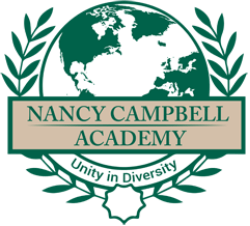19 Moral Capabilities
The 19 Moral Capabilities: A Framework for a Meaningful Life
At Nancy Campbell Academy, we believe that education must build character and intellect together. Alongside a rigorous academic curriculum, we help our students build their “inner architecture”—a reliable moral compass that will guide them throughout their lives. This foundation is built upon the 19 Moral Capabilities, a set of practical skills and virtues that empower students to navigate challenges, build strong communities, and lead with wisdom and purpose.

Capabilities in Action:
Building Unity in Diversity
While all 19 capabilities are important, some are at the very heart of our school’s motto and mission. The capability of “Building Unity in Diversity” is a core principle we live every day.
What it Means
Building unity in diversity means bringing people together, recognizing and celebrating our differences, and working towards a common goal. It’s about understanding that our diverse perspectives and strengths, when combined, make our community more innovative and resilient.
How We Practice This at NCA
- We learn about others: We take the time to learn about different cultures, perspectives, and experiences through our curriculum and community events.
- We promote inclusivity: We ensure that everyone’s voice is heard and respected, especially those from underrepresented groups.
- We foster collaboration: We organize projects and activities that require teamwork and the sharing of diverse ideas, highlighting the unique contribution each person brings.
Associated Virtues & Skills
Inclusivity: Cultural Competence
Respect: Team-building
Unity: Conflict Resolution
A Foundation for the Future
These 19 capabilities are the tools our students use to succeed at NCA, and they are the gifts they carry with them into the world. They provide a framework for our graduates to pursue their careers with excellence, contribute meaningfully to their families and communities, and lead lives of integrity and joyful purpose.
“Being at this school made me realize that NCA is more than a school because it gave me the opportunity to think everyday about academics and spirituality and how they go hand in hand…”
Explore all 19 Capabilities
These 19 capabilities are not just abstract ideas; they are actively woven into our classes, our mentorship programs, and our community life.
Click on each capability to learn more about its meaning and how it is developed at NCA.
1. Evaluating one's own strengths and weaknesses without involving ego
Evaluating our strengths and weaknesses without ego means looking at ourselves honestly. Seeing both the good and the areas for improvement without letting pride or self-doubt cloud our judgment. It’s about acknowledging our talents and capabilities while also recognizing the things we need to work on. This kind of self-awareness is crucial for our personal growth and for making better decisions in life.
2. Transcending one's lower passions by focusing on higher purposes and capabilities
Transcending lower passions means rising above impulses like anger, greed, or jealousy by focusing on more meaningful and noble goals. It’s about channeling our energy into actions that align with our values and contribute positively to our lives and the lives of others. This helps in developing self-control and living with purpose.
3. Managing one's affairs and responsibilities with rectitude of conduct based on moral and ethical principles
Managing our responsibilities with rectitude means doing what is right, even when it’s difficult. This involves making decisions and taking actions that align with strong moral and ethical principles, ensuring that we act with integrity and fairness in all areas of our lives. It’s about being trustworthy and dependable, someone others can rely on to do the right thing.
4. Learning from systematic reflection upon action within a consistent framework
Systematic reflection involves regularly looking back on our actions and decisions to learn from them. Using a consistent framework, such as a set of guiding questions or a reflection journal, helps us understand what worked well and what didn’t, so we can make better decisions in the future. This approach leads to continuous personal growth and improved decision-making.
5. Perceiving and interpreting the significance of current events and trends in light of an appropriate historical perspective
This capacity involves understanding present situations by looking at them through the lens of history. By recognizing patterns and trends from the past, you can better interpret current events and make informed decisions. It helps you avoid repeating past mistakes and builds a deeper understanding of the forces shaping today’s world.
6. Thinking systemically and strategically in search of solutions
Systemic and strategic thinking involves understanding how different parts of a problem or system are interconnected and planning our actions accordingly. This approach helps in identifying root causes of issues and devising long-term solutions rather than just quick fixes. It’s about seeing the bigger picture and making decisions that lead to sustainable success.
7. Forming a common vision of a desirable future based on shared values and principles, and articulating this in a way that inspires us to work towards its realization
A common vision is a shared picture of what the future could look like, based on the values and principles we all agree on. As leaders, forming and articulating this vision inspires us to work together towards achieving it. It involves understanding what motivates people, bringing us together, and guiding us towards a common goal.
8. Imbuing one's actions and thoughts with love
This capacity emphasizes the importance of love in guiding our thoughts and actions. Love in this context means caring deeply about others and acting with kindness, compassion, and empathy. It’s about approaching everything we do with a spirit of generosity and a desire to contribute positively to the lives of others.
9. Encouraging others and bringing happiness to their hearts
This capacity involves the ability to uplift others, boost their confidence, and bring joy into their lives. It’s about recognizing the importance of encouragement and positivity in helping people reach their full potential. Leaders who master this capacity create a supportive environment where everyone feels valued and motivated.
10. Taking initiative in a creative and disciplined way
Taking initiative means being proactive, seeing what needs to be done and doing it without being asked. When paired with creativity, it involves finding new and innovative ways to approach challenges. Discipline ensures that this creativity is channeled effectively, leading to meaningful and consistent progress.
11. Sustaining effort, perseverance, and overcoming obstacles
Perseverance is the ability to keep going despite difficulties. It’s about sustaining our effort over time, even when things get tough, and finding ways to overcome obstacles. Leaders with this capacity inspire others by their determination and resilience, showing that success often comes from hard work and persistence.
12. Participating effectively in consultation
Effective consultation is about engaging in discussions where everyone’s ideas are heard and valued. It involves active listening, thoughtful contribution, and a willingness to reach consensus. Leaders who excel in consultation help create decisions that are well-rounded and supported by the group, fostering a sense of ownership and unity.
13. Building unity in diversity
Building unity in diversity means bringing people together, recognizing and celebrating our differences, and working towards a common goal. It’s about understanding that diversity makes a group stronger by combining different perspectives and strengths. Leaders who cultivate unity in diversity create inclusive environments where everyone feels valued and empowered to contribute.
14. Committing oneself to empowering educational activities as a student and as a teacher
This capacity emphasizes the importance of education as a lifelong pursuit. Leaders who are both students and teachers constantly seek to learn and grow while also sharing our knowledge with others. Empowering education means not just learning for ourselves, but also helping others learn and develop their potential.
15. Recognizing relationships of domination and contributing to their transformation into relationships based on interconnectedness, reciprocity, and co-operation
This capacity involves identifying and addressing power imbalances in relationships. It’s about transforming relationships where one person or group dominates into ones based on mutual respect, cooperation, and shared responsibility. Leaders who excel in this capacity help create environments where everyone feels empowered and valued.
16. Contributing to the establishment of justice
Justice is about fairness, equality, and doing what is right. Leaders who contribute to justice work to ensure that everyone is treated fairly and that unjust practices are challenged and changed. This involves advocating for the rights of others, standing up against discrimination, and working towards a society where everyone has equal opportunities.
17. Serving in societal institutions so as to facilitate the expression of the talents of others that are affected by these institutions
Societal institutions like schools, governments, and organizations have the power to shape lives. Leaders who serve within these institutions should aim to create environments that help others realize their full potential. This means promoting policies and practices that nurture talent, encourage creativity, and provide opportunities for growth.
18. Being a responsible and loving family member as a child, spouse, or parent
This capacity highlights the importance of fulfilling our role within our family with love, care, and responsibility. Leadership begins at home, where the qualities of empathy, support, and responsibility are first nurtured. Being a loving family member strengthens our ability to lead with compassion and integrity in all areas of life.
19. Cultivating and creating a sense of beauty in every endeavor
Cultivating a sense of beauty means finding and creating beauty in everything we do, from our work to our relationships. This involves appreciating the aesthetics, harmony, and deeper meaning in life’s experiences and striving to bring that sense of beauty into our actions. Leaders who cultivate beauty inspire others to see the value and potential in every moment.
A Foundation for Life
These capabilities are woven into every aspect of life at Nancy Campbell Academy, from our classrooms to our community service projects. If our mission to develop character alongside intellect resonates with you, we invite you to learn more about joining our community
